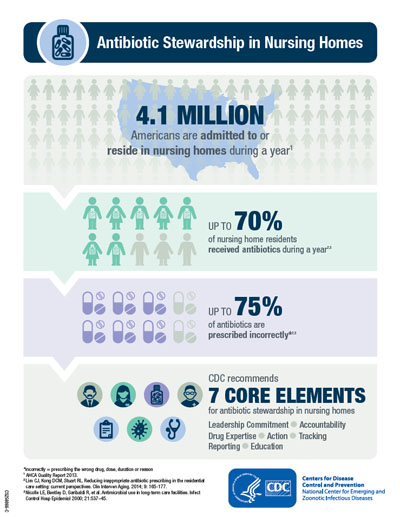New recommendations from the Centers for Disease Control and Prevention (CDC) advise all nursing homes to improve antibiotic prescribing practices and reduce their inappropriate use to protect residents from the consequences of antibiotic-resistant infections, such as C. difficile.

To guide these improvements, CDC released a new resource: Core Elements of Antibiotic Stewardship for Nursing Homes. The Core Elements for Nursing Homes expand upon CDC’s recommendation last year that all acute care hospitals implement an antibiotic stewardship program designed to optimize treatment of infections while reducing adverse events associated with antibiotic use.
Approximately 4.1 million Americans are admitted to or reside in nursing homes each year. Antibiotics are the most frequently prescribed medications in nursing homes. Up to 70 percent of residents receive one or more courses of antibiotics during a year. Up to 75 percent of antibiotics prescribed in nursing homes are given incorrectly, meaning either the drug is unnecessary or the prescription is for the wrong drug, dose, or duration.
“Superbugs that are hard to treat pose a health risk to all Americans, particularly the elderly whose bodies don’t fight infection as well,” said CDC Director Tom Frieden, M.D., M.P.H. “One way to keep older Americans safe from these superbugs is to make sure antibiotics are used appropriately all the time and everywhere, particularly in nursing homes.”
Read more HERE

